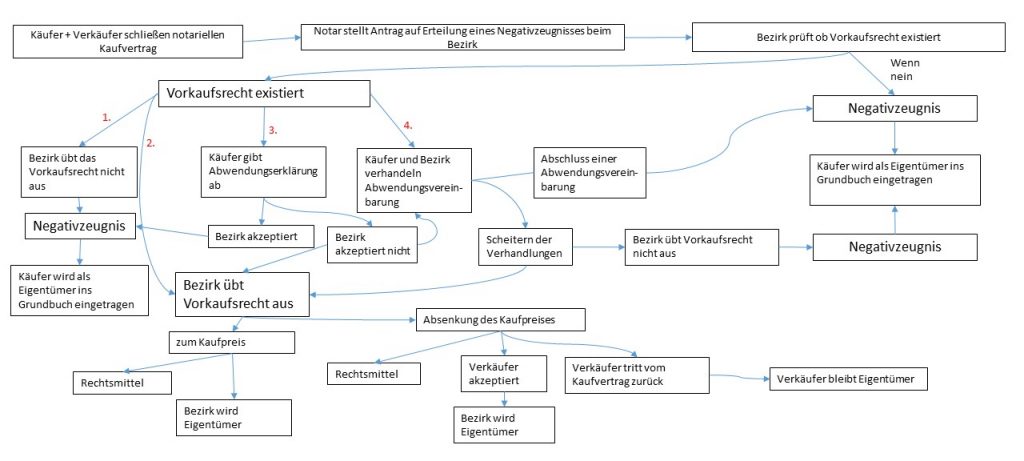Right of first refusal in social preservation areas
The district's statutory right of first refusal must be observed when purchasing properties that are located in the area of application of a milieu protection area. Pursuant to Section 24 (1) Sentence 1 No. 4 BauGB, the district has a statutory right of first refusal in the area covered by a milieu protection ordinance when selling the property, i.e. it enters into the purchase agreement on the buyer's side. It is at the district's discretion whether or not to exercise the right of first refusal, which makes planning and project development more difficult for investors. The deadline for exercising the right of first refusal is two months from receipt of the purchase agreement by the notary notarizing the contract. However, the district often learns from tenants beforehand that a sale is pending.
The chart below depicts the various options available when the district/municipality exercises its right of first refusal:
1. averting the right of first refusal
The purchaser who wishes to prevent the district from exercising its right of first refusal can avert the case of first refusal. To this end, the district regularly requires not only a binding declaration by the purchaser that he will use the property in accordance with the Milieu Protection Ordinance and that he is in a position to do so, but rather the conclusion of an avoidance agreement in the form of a public law contract. In this averting agreement, the buyer often agrees to obligations that go far beyond the legal requirements for milieu protection. For example, in its model aversion agreement, the district of Friedrichshain-Kreuzberg requires the purchaser to refrain from establishing residential or partial ownership. The purchaser is also required to undertake to refrain from demolition work, energy-efficient refurbishment measures and the addition of balconies and elevators. The purchaser must commit to this for up to 20 years and grant the state of Berlin a corresponding easement in the land register to secure the property. The avoidance agreements also regularly provide for substantial contractual penalties.
The Friedrichshain-Kreuzberg district's sample aversion agreement (as of March 2017) is available at: https://www.berlin.de/ba-friedrichshain-kreuzberg/politik-und-verwaltung/bezirksamt/florian-schmidt/artikel.574275.php)
Currently, since 21.3.2019, a new model aversion agreement is said to exist for all districts (source: press release d. Senatsverwaltung für Stadtentwicklung und Wohnen of 25.3.2019). Innovations are to be:
- additional tenant information rights
- Rent-controlling regulations designed to cap rent increases above and beyond the statutory rent brake
- Exclusion of graduated rental agreements
- Restriction of the assertion of own need by the owner
The buyer does not have to commit himself beyond the legal requirements. If the district does not allow itself to be negotiated here, the purchaser could take action before the administrative court against the subsequent exercise notice.
2. no right of first refusal in the area of validity of a development plan
The Berlin Court of Appeal is currently reviewing a decision of the Berlin Regional Court, according to which the district does not have a statutory right of first refusal pursuant to Section 26 No. 4 of the German Building Code (BauGB) if the property to be sold is located within the scope of a development plan, complies with these provisions and there is no deplorable condition, so-called privilege of use in conformity with the measures(see Case Law: No Right of First Refusal within the Scope of a Development Plan).
3. no right of first refusal in the case of rights under the German Condominium Act and heritable building rights
The district's right of first refusal is excluded if apartments that have already been subdivided are sold or only heritable building rights to the property are granted, cf. Section 24 (2) BauGB.
4. possibilities of land transfer without the right of first refusal
The statutory right of first refusal only applies to sales of land. However, other forms of transfer are possible in addition to the classic land purchase agreement without a right of first refusal for the district. In this way, uncertainty regarding the exercise of the right of first refusal and the expense of legal review can be minimized.

